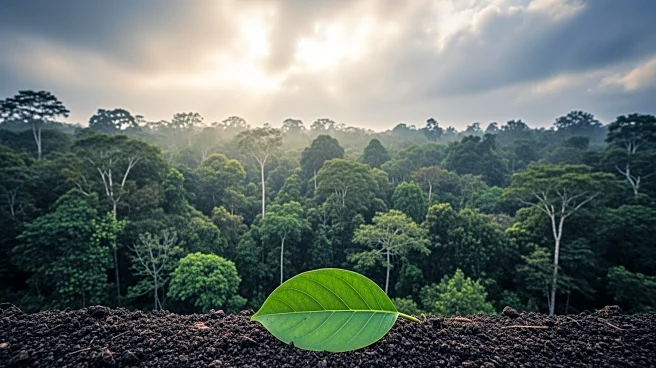What's Happening?
Thousands of climate protesters have gathered at the gates of the COP30 climate talks in Belém, Brazil, to voice their concerns over ongoing environmental issues. The demonstrators, including indigenous
communities, Brazilian youth groups, and activists, are advocating for the end of fossil fuel use and the legal recognition of indigenous territories. The protestors carried symbolic coffins labeled 'Oil, Coal, and Gas' and signs demanding 'demarcation now.' This marks the first time since 2021 that public protests have been allowed outside the UN climate talks, as the previous three conferences were held in countries that do not permit public demonstrations. The protests have been largely peaceful, although a breach of security lines earlier in the week resulted in minor injuries to two security staff and some damage to the venue.
Why It's Important?
The protests at COP30 highlight the growing global demand for urgent action against climate change and the protection of indigenous rights. Indigenous groups are recognized as crucial protectors of biodiversity and forests, particularly in the Amazon, which is vital for global ecological balance. The demonstrations underscore the frustration of many who feel that international climate negotiations have not adequately addressed the urgency of the climate crisis. The involvement of youth groups also reflects a generational demand for sustainable policies that ensure a livable future. The protests could influence the negotiations by pressuring world leaders to commit to more aggressive climate action and policies that respect indigenous land rights.
What's Next?
As the COP30 talks continue, negotiators from nearly 200 countries will need to consider the demands of the protesters and the broader public. The pressure from these demonstrations may lead to more ambitious commitments to reduce fossil fuel dependency and enhance protections for indigenous territories. The outcome of the talks could set a precedent for future climate policies and international cooperation. Stakeholders, including governments, NGOs, and civil society, will be closely monitoring the negotiations to assess the potential impact on global climate strategies.
Beyond the Headlines
The protests at COP30 also bring attention to the ethical and cultural dimensions of climate change, particularly the rights of indigenous peoples who have historically been marginalized in environmental decision-making. The call for 'demarcation now' highlights the ongoing struggle for land rights and the need for legal frameworks that recognize and protect indigenous territories. This movement could inspire similar actions worldwide, emphasizing the importance of integrating indigenous knowledge and leadership in climate solutions.










